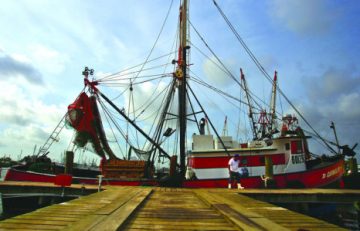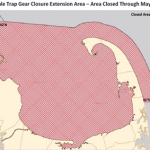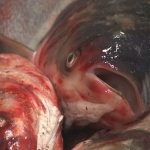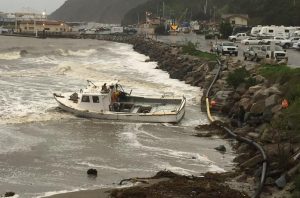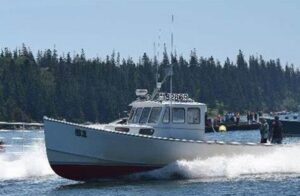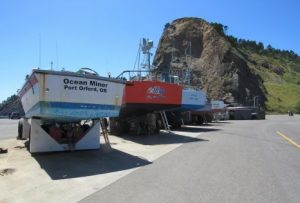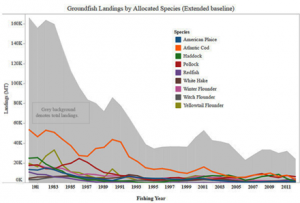Tag Archives: India

South Carolina shrimper says Trump’s tariffs will provide ‘immediate relief’ to US fishery
CJ Seafood owner Craig Reaves told “America Reports” that so much of the industry is being outsourced to Southeast Asia, Ecuador, India and South America, while the U.S. fishery has been “crushed.” “I’m a lifelong shrimper. My dad was a shrimper, so we’re generational fishermen, and we’ve been getting killed by imports for not just years, but literally decades,” Reaves said. “So, we’ve been suffering for a long, long time, and these tariffs, we believe, are going to give us some immediate relief. Also, it’s bringing attention to our industry, who is dying. We’ve outsourced our whole industry. Ninety-four percent of the shrimp consumed in the United States is imported.” Video, more, >>CLICK TO READ<< 07:52
Louisiana: Rep. Higgins asks President Trump for seafood tariff
 Rep. Clay Higgins (R-LA) has delivered an official letter to President Trump, requesting tariffs and increased trade enforcement on seafood imports. Countries specifically mentioned in the letter include China, Ecuador, India, Indonesia, and Vietnam, which Higgins says are hampering domestic shrimpers, fishermen, and crawfish producers. He says foreign seafood industries are heavily subsidized and engage in illegal dumping into the United States, artificially driving down prices and disrupting fair market conditions. You can read the letter in full below. more, >>CLICK TO READ<<14:53
Rep. Clay Higgins (R-LA) has delivered an official letter to President Trump, requesting tariffs and increased trade enforcement on seafood imports. Countries specifically mentioned in the letter include China, Ecuador, India, Indonesia, and Vietnam, which Higgins says are hampering domestic shrimpers, fishermen, and crawfish producers. He says foreign seafood industries are heavily subsidized and engage in illegal dumping into the United States, artificially driving down prices and disrupting fair market conditions. You can read the letter in full below. more, >>CLICK TO READ<<14:53
US taxpayer funds went to foreign competition for domestic shrimpers
 Fishermen and shrimpers in the United States have been in a decades-long battle with the very institutions meant to protect them, specifically the U.S. Treasury Department and its World Bank delegation. U.S. trade law bars the support of competing industries in which there is excess supply. Despite such laws, U.S. taxpayers spent two decades funding “aquaculture” projects in Vietnam, India, Ecuador and Indonesia, countries that now supply the overwhelming majority of shrimp to U.S. consumers. “There’s a law on the books that requires the United States, their directors that are at these international financial institutions, to use their voice and vote to oppose any project that where there’s a commodity that’s produced in surplus and where export to the United States would seriously injure a domestic industry,” Nathan Rickard, a trade lawyer who represents the Southern Shrimp Alliance,,, more, >>CLICK TO READ<< 12:45
Fishermen and shrimpers in the United States have been in a decades-long battle with the very institutions meant to protect them, specifically the U.S. Treasury Department and its World Bank delegation. U.S. trade law bars the support of competing industries in which there is excess supply. Despite such laws, U.S. taxpayers spent two decades funding “aquaculture” projects in Vietnam, India, Ecuador and Indonesia, countries that now supply the overwhelming majority of shrimp to U.S. consumers. “There’s a law on the books that requires the United States, their directors that are at these international financial institutions, to use their voice and vote to oppose any project that where there’s a commodity that’s produced in surplus and where export to the United States would seriously injure a domestic industry,” Nathan Rickard, a trade lawyer who represents the Southern Shrimp Alliance,,, more, >>CLICK TO READ<< 12:45
South Carolina shrimpers applaud decision to impose duties on shrimp imported from four countries
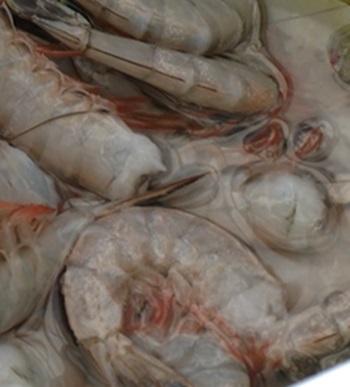 South Carolina shrimpers are celebrating the U.S. International Trade Commission’s recent decision to crack down on frozen shrimp imports from four countries. The ITC voted in favor of issuing countervailing duties on frozen, warm-water shrimp imports from Ecuador, India, and Vietnam after the U.S. Department of Commerce determined those governments were illegally subsidizing the industry. “We’re grateful because it’s an acknowledgment of what we feel and we experience in the industry and we see on a daily basis,” said Bryan Jones, a first-generation shrimper who lives in McClellanville. Jones serves as vice president of the South Carolina Shrimpers Association and was among a group of commercial fishermen who testified before the ITC in Washington, D.C. in October. more, >>CLICK TO READ<< 14:20
South Carolina shrimpers are celebrating the U.S. International Trade Commission’s recent decision to crack down on frozen shrimp imports from four countries. The ITC voted in favor of issuing countervailing duties on frozen, warm-water shrimp imports from Ecuador, India, and Vietnam after the U.S. Department of Commerce determined those governments were illegally subsidizing the industry. “We’re grateful because it’s an acknowledgment of what we feel and we experience in the industry and we see on a daily basis,” said Bryan Jones, a first-generation shrimper who lives in McClellanville. Jones serves as vice president of the South Carolina Shrimpers Association and was among a group of commercial fishermen who testified before the ITC in Washington, D.C. in October. more, >>CLICK TO READ<< 14:20
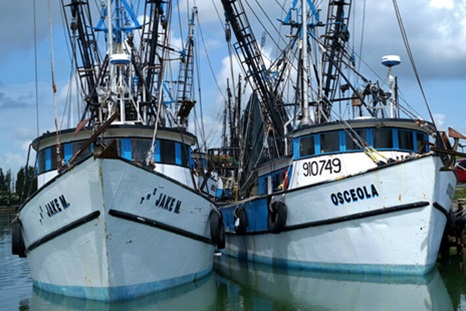
Struggling Valley shrimpers receive good news on new import measures
In an industry where bad news is the norm, shrimpers in Texas and elsewhere in the United States finally have a sliver of good news. The U.S. International Trade Commission, or ITC, on Tuesday determined that the U.S. shrimp industry is being “materially injured” by imports of frozen warm-water shrimp from Indonesia that the U.S. Department of Commerce says are being sold in this country at less than fair value, and also by shrimp imports from Ecuador, India and Vietnam that the Commerce Department says are being subsidized by the governments of those countries. As a result of the ITC’s determinations, the Commerce Department will issue “countervailing duty orders on imports of this product from Ecuador, India and Vietnam and an anti-dumping duty order on imports of this product from Indonesia,” the ITC announced Tuesday. more, >>CLICK TO READ<< 11:57
U.S. International Trade Commission votes in favor of antidumping, countervailing duties on shrimp imports
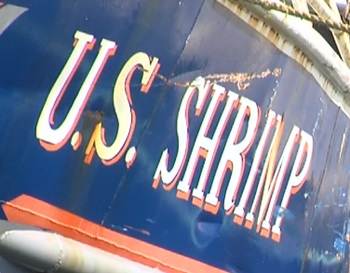 Southeast Texas fishermen are celebrating a win after the U.S. International Trade Commission voted in favor of antidumping and countervailing duties on shrimp imports from four countries. On Wednesday morning, the U.S. International Trade Commission voted in favor of antidumping and countervailing duty petitions filed by the American Shrimp Processors Association against imports of frozen warm-water shrimp from Ecuador, India, Indonesia, and Vietnam. As a result of the commission’s vote, duties ranging from 2.84% to 221.82% will be imposed on imports of shrimp from the four countries. “We are thrilled with the outcome of today’s vote,” said Trey Pearson, president of ASPA. more, >>CLICK TO READ<< 13:19
Southeast Texas fishermen are celebrating a win after the U.S. International Trade Commission voted in favor of antidumping and countervailing duties on shrimp imports from four countries. On Wednesday morning, the U.S. International Trade Commission voted in favor of antidumping and countervailing duty petitions filed by the American Shrimp Processors Association against imports of frozen warm-water shrimp from Ecuador, India, Indonesia, and Vietnam. As a result of the commission’s vote, duties ranging from 2.84% to 221.82% will be imposed on imports of shrimp from the four countries. “We are thrilled with the outcome of today’s vote,” said Trey Pearson, president of ASPA. more, >>CLICK TO READ<< 13:19
Workers ‘treated like slaves’ on Scottish fishing boats
 Thirty-five men from the Philippines, Ghana, India and Sri Lanka were recognised as victims of modern slavery by the Home Office after being referred to it between 2012 and 2020. The workers were employed by TN Trawlers and its sister companies, owned by the Nicholson family, based in the small town of Annan on the southern coast of Scotland. The TN Group denied any allegation of modern slavery or human trafficking and said its workers were well treated and well paid. The company was the focus of two long-running criminal investigations but no cases of human trafficking or modern slavery have come to trial, although some of the men waited years to give evidence. While TN Trawlers’ lead director, Thomas Nicholson, was under active investigation, TN Group companies continued recruiting new employees from across the world. Video, Photos, more, >>CLICK TO READ<< 08:37
Thirty-five men from the Philippines, Ghana, India and Sri Lanka were recognised as victims of modern slavery by the Home Office after being referred to it between 2012 and 2020. The workers were employed by TN Trawlers and its sister companies, owned by the Nicholson family, based in the small town of Annan on the southern coast of Scotland. The TN Group denied any allegation of modern slavery or human trafficking and said its workers were well treated and well paid. The company was the focus of two long-running criminal investigations but no cases of human trafficking or modern slavery have come to trial, although some of the men waited years to give evidence. While TN Trawlers’ lead director, Thomas Nicholson, was under active investigation, TN Group companies continued recruiting new employees from across the world. Video, Photos, more, >>CLICK TO READ<< 08:37
Shrimp Trade Action
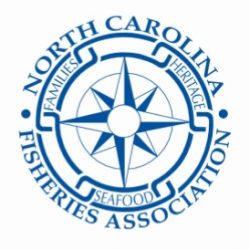 For several months, shrimpers, packers and dealers have been working on trade action which is a new anti-dumping investigation of frozen warm water shrimp from Ecuador, India, Indonesia and Vietnam. Those working on this are from the states of North Carolina thru Texas. This next stage requires those involved in the fishery to fill out questionnaires which needs to be submitted to the International Trade Commission before July 26, 2024. This ITC investigation is being carried out to determine if unfair trade practices by other countries importing shrimp to the U.S have caused harm to our domestic shrimpers and if higher tariffs are necessary. In order to show harm, the domestic industry MUST FILL OUT THE QUESTIONNAIRE ACCURATELY AND SUBMIT IT TO THE ITC BY JULY 26th!!!! more, >>CLICK TO READ<< 06:44
For several months, shrimpers, packers and dealers have been working on trade action which is a new anti-dumping investigation of frozen warm water shrimp from Ecuador, India, Indonesia and Vietnam. Those working on this are from the states of North Carolina thru Texas. This next stage requires those involved in the fishery to fill out questionnaires which needs to be submitted to the International Trade Commission before July 26, 2024. This ITC investigation is being carried out to determine if unfair trade practices by other countries importing shrimp to the U.S have caused harm to our domestic shrimpers and if higher tariffs are necessary. In order to show harm, the domestic industry MUST FILL OUT THE QUESTIONNAIRE ACCURATELY AND SUBMIT IT TO THE ITC BY JULY 26th!!!! more, >>CLICK TO READ<< 06:44
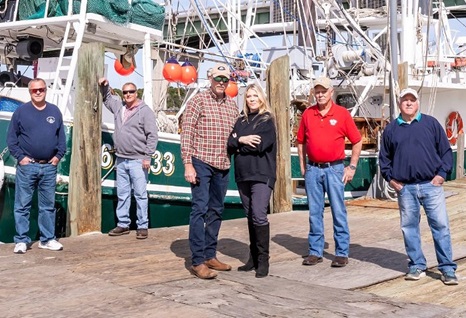
Coastal Georgia Shrimping: A new season of uncertainty, possibilities and hope
In a word, “difficult,” said Dee Kicklighter of their most recent shrimping season. Kicklighter, who has worked with Mathews for about eight years, has seen first-hand how the unpredictability of the business can be costly. “You plan for something to be one price, and then the next week you come back, and it could be potentially thousands of dollars more, depending on what you’re dealing with,” he said of fluctuating prices, including fuel. Over the years, Mathews said the ever-changing cost of fuel has taken a toll on the number of shrimpers in the industry. It’s not just Georgia shrimpers contending with the negative effects from imports. North Carolina, Texas, Louisiana, Florida and other coastal states are also feeling the friction of narrowing profit margins that threaten their way of life. Photos, more, >>click to read<< 09:15
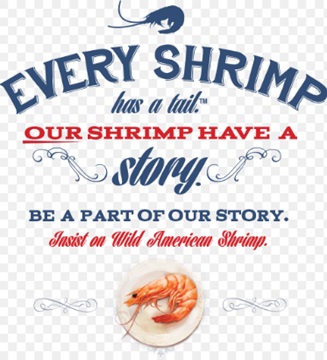
American Shrimp Processors Association Launches Trade Petitions Addressing Unfair Dumping and Illegal Subsidies
Today, the American Shrimp Processors Association (ASPA) filed trade petitions seeking antidumping duties on imported frozen warmwater shrimp from Ecuador and Indonesia and countervailing duties on imported shrimp from Ecuador, India, Indonesia, and Vietnam. The U.S. shrimp market has been overwhelmed by massive quantities of underpriced shrimp imports, resulting in unsustainably low dockside prices, falling domestic market share, significantly lower profit margins, and historically high inventory levels. >>click to read<< 07:56

Cassidy Urges International Trade Commission to Keep Antidumping Orders on Shrimp from China, India, Thailand, Vietnam
U.S. Senator Bill Cassidy M.D. (R-LA) expressed his support for continuing antidumping orders on imports of frozen warmwater shrimp imported from China, India, Thailand, and Vietnam in a letter to U.S. International Trade Commission Chairman David Johanson. Cassidy highlighted the importance of these antidumping orders to ensure Louisiana’s shrimp industry can compete on a level playing field. “Dumped imports from China, India, Thailand, and Vietnam surged into the U.S. market, driving down prices, depressing earnings, and making it increasingly difficult to cover the costs of production. Faced with declining revenues and market share, many small fishermen, processors, and distributors were forced to close. The orders have imposed needed discipline on imports and allowed our vital Louisiana shrimp industry to survive,” wrote Dr. Cassidy. >click to read< 14:40
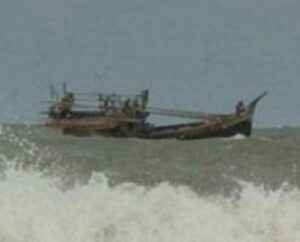
250 fishermen go missing as 16 trawlers sink in Bay of Bengal
Over 250 fishermen of Patuakhali remained missing as 16 fishing trawlers capsized in the Bay of Bengal amid inclement weather on Friday, said Naval Police on Sunday. About 150 fishermen of 18 trawlers that sank in the Bay near Kuakata in Patuakhali have been rescued so far, said Akhtar Morshed, officer-in-charge (OC) of Kuakata Naval Police Outpost. Locals along with a rescue trawler of the fish wholesalers’ association reached the fish landing centre with the rescued fishermen from Saturday evening to 11pm on Sunday, the OC added. 3 stories, scroll down, >click to read< 12:27
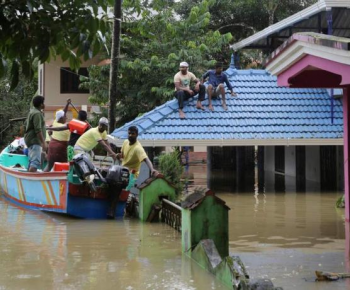
Like Batman and Superman, the fishermen of Kerala are the real ‘superheroes of the flood’
The police asked the parishes to summon boats and crew. The government offered reparations to the fishermen for loss of earnings but they politely refused: “We do not want to be paid for saving our brothers and sisters”. Almost 3 thousand fishermen rescued more than 65 thousand people. >click to read<12:23
Shooting won’t stop us: Tamil Nadu fishermen
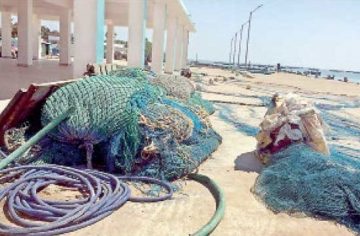 At the break of dawn on March 05, 2017, as the rest of world was sleeping, Charles and four other fishermen fired up the engine of their trawler and left for fishing from Pamban Island, Rameswaram, India. Charles and his fellow fishermen were waiting for hours after setting the net in the middle of the sea near Danushkodi. Later, Charles pulled the net into the trawler and checked what was collected, but it was empty. The fishermen were anxious as they did not want to return empty-handed. One of the fishermen suggested to sail a little far and see whether they would be able to get a good catch. Charles and the others have already heard of stories of local fishermen being arrested by the Sri Lankan Navy when they tried to reach,,, click here to continue reading the article 19:36
At the break of dawn on March 05, 2017, as the rest of world was sleeping, Charles and four other fishermen fired up the engine of their trawler and left for fishing from Pamban Island, Rameswaram, India. Charles and his fellow fishermen were waiting for hours after setting the net in the middle of the sea near Danushkodi. Later, Charles pulled the net into the trawler and checked what was collected, but it was empty. The fishermen were anxious as they did not want to return empty-handed. One of the fishermen suggested to sail a little far and see whether they would be able to get a good catch. Charles and the others have already heard of stories of local fishermen being arrested by the Sri Lankan Navy when they tried to reach,,, click here to continue reading the article 19:36
Home after 6 months detention, fishermen recall ordeal in Gulf – For six months, Indian fisherman S. George lived in fear on a boat, thinking he would never see his wife and children again. Click here to read the story 20:40
Helping US Shrimpers, New Trump order might hit India’s shrimp exports
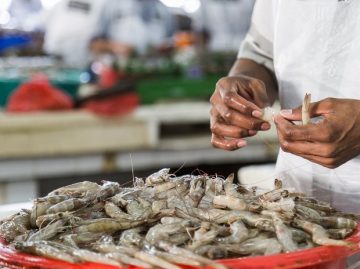 The $5.5-billion Indian seafood export market might face new restrictions in America. The new Donald Trump government, in an executive order, is set to enforce countervailing duties strictly on countries held to be dumping goods. America is the major importer of Indian seafood, with a share of 28.5 per cent in 2015-16, for 153,695 tonnes worth $1.3 billion. Frozen shrimp is the principal item of export to the US, with a share of 94 per cent in value terms. Another executive order directs their department of commerce and the Office of the US Trade representative to examine every form of trade abuse and non-reciprocal practice that contribute to the US’ large and persistent trade deficit, largest of any major nation in 2016 at $500 billion. Within 90 days, both these agencies are to give a comprehensive report to the President on the causes. “The US is the only country which is imposing an anti-dumping duty on Indian shrimp, to give level playing to its producers. click to continue reading the story 19:30
The $5.5-billion Indian seafood export market might face new restrictions in America. The new Donald Trump government, in an executive order, is set to enforce countervailing duties strictly on countries held to be dumping goods. America is the major importer of Indian seafood, with a share of 28.5 per cent in 2015-16, for 153,695 tonnes worth $1.3 billion. Frozen shrimp is the principal item of export to the US, with a share of 94 per cent in value terms. Another executive order directs their department of commerce and the Office of the US Trade representative to examine every form of trade abuse and non-reciprocal practice that contribute to the US’ large and persistent trade deficit, largest of any major nation in 2016 at $500 billion. Within 90 days, both these agencies are to give a comprehensive report to the President on the causes. “The US is the only country which is imposing an anti-dumping duty on Indian shrimp, to give level playing to its producers. click to continue reading the story 19:30
“Operation Icebreaker” – Chinese authorities bust huge seafood smuggling ring
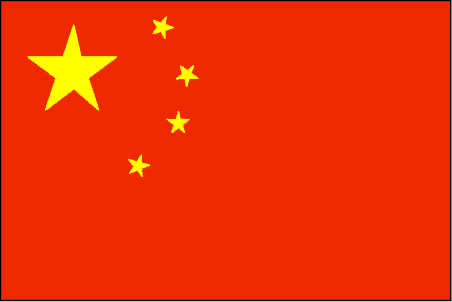 Frozen fish and crustaceans from Canada, India, Norway and Thailand were seized by Huangpu Customs in the southern port city of Guangzhou. But 21 “seafood smuggling cells” were targeted across the country and 31 people arrested in cities like Zhanjiang (a key shrimp trading hub), Tianjin and Beijing. Noticeably the latest crackdown features imported salmon and cod but also shrimp and crab. And crucially, the authorities have specifically pointed to mislabeling of species with sablefish and salmon stamped as containing lower-end species like mackerel and Atlantic cod – many of which are imported tax-free by processors for re-export. Read the rest here 15:04
Frozen fish and crustaceans from Canada, India, Norway and Thailand were seized by Huangpu Customs in the southern port city of Guangzhou. But 21 “seafood smuggling cells” were targeted across the country and 31 people arrested in cities like Zhanjiang (a key shrimp trading hub), Tianjin and Beijing. Noticeably the latest crackdown features imported salmon and cod but also shrimp and crab. And crucially, the authorities have specifically pointed to mislabeling of species with sablefish and salmon stamped as containing lower-end species like mackerel and Atlantic cod – many of which are imported tax-free by processors for re-export. Read the rest here 15:04
Shrimp subsidies in five nations undercutting U.S. prices, importers must pay bonds up to nearly 63 percent to offset – US Commerce
 “It’s a good day. It means that a substantial percentage of the shrimp imported into this country will face some level of at least temporary tariff until such time as the final determine is made about the amount, if any,” said David Veal, executive director of a group representing shrimp processors in the five Gulf of Mexico states, Georgia and North Carolina. continued
“It’s a good day. It means that a substantial percentage of the shrimp imported into this country will face some level of at least temporary tariff until such time as the final determine is made about the amount, if any,” said David Veal, executive director of a group representing shrimp processors in the five Gulf of Mexico states, Georgia and North Carolina. continued
‘India has science, business interests in the Arctic’
Besides scientific interests, India also has business interests related to mineral resources, fisheries and shorter sea routes in the planet’s far north, Nayak said. “Once the Arctic is free from ice, fisheries will naturally emerge as a major resource. We will have other things like it could open up for shipping. So we also need to understand how situation would change from ice to ocean and its impact,” he said. continued whoo boy!
The Coalition of Gulf Shrimp Industries (COGSI) has asked the U.S. government financial support of special duties to offset unfair trade advantage
 The Coalition of Gulf Shrimp Industries (COGSI) has asked the U.S. government financial support, through the application of special duties, to compensate for subsidized shrimp imports from China, Ecuador, India, Indonesia, Malaysia, Thailand and Vietnam. “These duties are needed to offset the unfair trade advantage currently held by these countries,” the Coalition wrote. Read More
The Coalition of Gulf Shrimp Industries (COGSI) has asked the U.S. government financial support, through the application of special duties, to compensate for subsidized shrimp imports from China, Ecuador, India, Indonesia, Malaysia, Thailand and Vietnam. “These duties are needed to offset the unfair trade advantage currently held by these countries,” the Coalition wrote. Read More
CARL SAFINA and BRETT JENKS – How to Catch Fish and Save Fisheries – TURF. Another recipe for Catch Shares and Closures!
These guys are just to smart. Silver bullet? Buckshot? If I had a rocket launcher ……..
This will help to understand the mindset. Scientists Confirm That Reality is an Illusion http://www.youtube.com/watch?v=qngieHWZXcM&feature=related
TURF reserves are not a silver bullet. They might, however, be the silver buckshot. With nearly one billion people reliant on the ocean for their primary source of protein, stakes are high. If the most fish-dependent nations adopted widespread networks of TURF Reserve, they can potentially create enough fish recovery to feed hundreds of millions of people. That’s a big if, however. The solution is not to fix a small number of fisheries. We need thousands of TURF reserves in dozens of countries just to get the ball rolling. Ultimately, we need a commitment of governments, foundations, NGOs and the private sector to forge a major investment in near shore fisheries in the developing tropics. The coastal communities themselves must unfurl the ocean’s silver lining.http://www.nytimes.com/2012/10/20/opinion/how-to-catch-fish-and-save-fisheries.html?_r=3&
Carl Safina is founding president of the Blue Ocean Institute at Stony Brook University, where he is an adjunct professor in marine sciences. Brett Jenks is the president and chief executive of Rare, a global conservation organization based in Arlington, Virginia.







